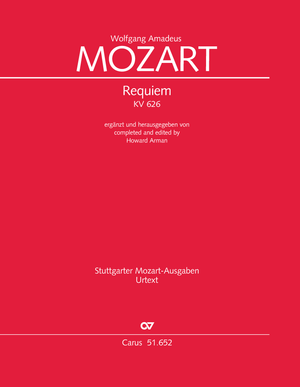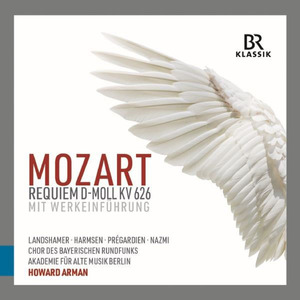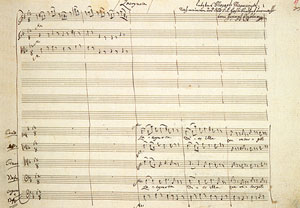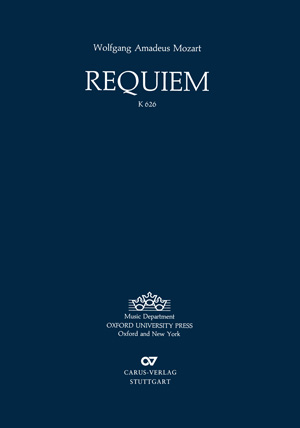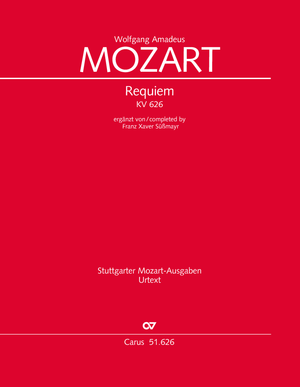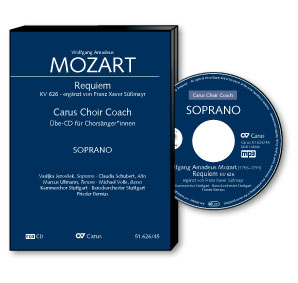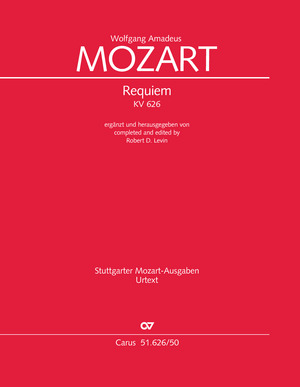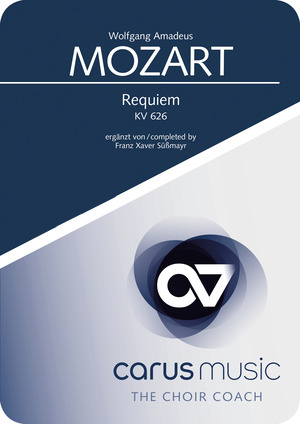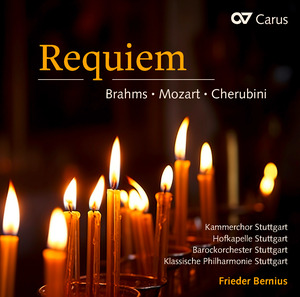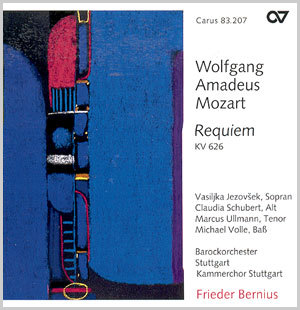The English conductor and composer Howard Arman has presented us with a completed version of Mozart’s Requiem. “Another one?” you might ask, since this publication is only the latest in a long line reaching back to the traditional Süßmayr version. Yet such is the enormous power of Mozart’s score that the challenge and appeal of completing it remain undiminished. After two decades of intensive study, Howard Arman’s additions to Mozart’s great original show the requisite care and respect while incorporating many new insights.
Arman’s approach is particularly fruitful. Always aware of the appropriate limits to such re-creative work, he orients himself towards the typical characteristics of Mozart’s brilliant composing style: The masterly compositional technique, the search for innovative solutions to every problem, and even the terse treatment of the text with extremely suggestive harmonies. All of this leads to a number of new listening experiences. In the Tuba mirum, for example, we enjoy a warm, cohesive ensemble sound, supported by the bassoons, which depart from the bass line. The Confutatis presents a quite different picture: Even the basset horns are drawn down into the infernal depths. This effect is reinforced by the independence of the trombones; rather than simply following the choral parts, the instrument’s unique sound is given an opportunity to shine. Arman’s Lacrimosa achieves a lively Mozartian feel by granting the voices considerable freedom rather than following a rigid pattern. And he concludes the movement with a fugal Amen, whereby the focus is not so much on the counterpoint itself, but rather – in the spirit of Mozart – on creating a sense of drama and illuminating the theme in all its possible facets. Mozart’s fragment ends with the Hostias, and so does Arman’s completion.
For the four following movements (Sanctus to Communio) we have nothing from Mozart, and so here, where the master is silent, Arman finally returns to Süßmayr, the man who was closest to Mozart at the time of his death and whose efforts to fill the blank manuscripts still garner our respect today.
Arman’s version has already proven its practical value. The premiere with the Bavarian Radio Choir was enthusiastically received by audiences and press alike – and celebrated as offering a scholarly, entirely fresh perspective on Mozart’s masterpiece.
- World premiere by the Bavarian Radio Choir
- Enthusiastically received by audience and press
Contents
-
Composer
Wolfgang Amadeus Mozart
| 1756-1791As the son of the deputy Kapellmeister to the Salzburg Prince-Archbishop, Mozart was constantly surrounded by church music in his youth. On his travels Mozart became familiar with Italian church music, and later in Vienna he studied the works of Bach and Handel. After moving to Vienna he was faced with the new challenges of composing opera and piano concertos, and significantly the “C Minor Mass” KV 427, the greatest sacred work of the first Vienna years, remained unfinished. The last period of his life again shows a change of direction to church music: Mozart successfully applied to succeed the terminally ill Leopold Hoffmann as Kapellmeister at St Stephen's Cathedral, but he was unable to take up the position as he died before Hoffmann. A gem such as the “Ave verum” KV 618 and the incomplete Requiem KV 626 give us an idea of what Mozart might have achieved as a composer of sacred music if he had taken up this important position. Personal details
-
Editor
Howard Arman
| 1954Versatility is a musical characteristic which defines the work of the London-born conductor and composer Howard Arman. He has distinguished himself in all aspects of classical music, from historically-informed performances of baroque music, to opera, symphony and jazz as well as large-scale orchestral “singalong” concerts, and his work as a writer and narrator of broadcasts about music. Choral music is of particular importance. From 1998 to 2013 he was Artistic Director of the MDR (Central German Radio) Choir, which appointed him Honorary Conductor in 2019. From 2016 to 2022 he was Artistic Director of the Bavarian Radio Choir, with whom he similarly produced a large number of CD, video and television productions. Howard Arman has appeared as a guest conductor throughout Europa as well as in Asia and America.
His own compositions include choral, orchestral and stage works, beside numerous arrangements for choir and orchestra, and a series of editions of music from the 17th to the 19th century. He has held professorships both at the Mozarteum, and at the Hochschule Lucerne in Switzerland.
At Carus Howard Arman has presented us with a completed version of Mozart’s Requiem.
Personal details
-
Arranger
Howard Arman
| 1954Versatility is a musical characteristic which defines the work of the London-born conductor and composer Howard Arman. He has distinguished himself in all aspects of classical music, from historically-informed performances of baroque music, to opera, symphony and jazz as well as large-scale orchestral “singalong” concerts, and his work as a writer and narrator of broadcasts about music. Choral music is of particular importance. From 1998 to 2013 he was Artistic Director of the MDR (Central German Radio) Choir, which appointed him Honorary Conductor in 2019. From 2016 to 2022 he was Artistic Director of the Bavarian Radio Choir, with whom he similarly produced a large number of CD, video and television productions. Howard Arman has appeared as a guest conductor throughout Europa as well as in Asia and America.
His own compositions include choral, orchestral and stage works, beside numerous arrangements for choir and orchestra, and a series of editions of music from the 17th to the 19th century. He has held professorships both at the Mozarteum, and at the Hochschule Lucerne in Switzerland.
At Carus Howard Arman has presented us with a completed version of Mozart’s Requiem.
Personal details
Frequent questions about this work
Which version of the Requiem does the recorded practice aids Carus Choir Coach and App go with?
 There are no questions and answers available so far or you were unable to find an answer to your specific question about this work? Then click here and send your specific questions to our Customer Services!
There are no questions and answers available so far or you were unable to find an answer to your specific question about this work? Then click here and send your specific questions to our Customer Services!


